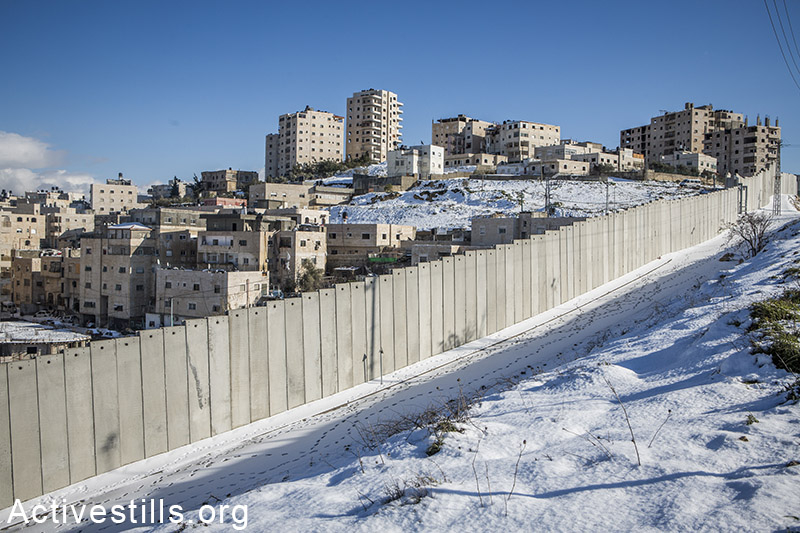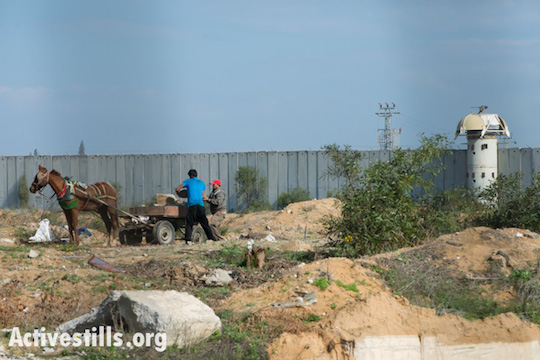If the separation barrier neither stops terrorists nor marks an actual border between Israel and Palestine, then what is it actually for?

The vast majority of stabbing attacks carried out inside Israel over the past couple of weeks have been carried out by West Bank Palestinians. Most of the attackers did not have permits to cross into Israel for work or any other reason.
How did they get in? Didn’t Ariel Sharon build the separation barrier, apartheid wall, security fence, or whatever you want to call it, just for this reason? To make it harder for Palestinian terrorists to walk right into Israel to carry out attacks in the center of cities?
It is still common to hear people say that the suicide bombings of the Second Intifada were ended by the sole virtue of the wall/fence/barrier, which kept all the bad guys out. Indeed, terrorist bombings almost entirely disappeared five years after construction on the barrier began. But we know that correlation does not equal causation.
The Second Intifada ended for a number of reasons, only one of which was the separation barrier. That becomes especially clear when you look at how little of the barrier had actually been constructed by the time the attacks stopped.
The violence of the Second Intifada wound down because Israeli intelligence managed to wear down armed Palestinian groups. Popular Palestinian support for the violent uprising slowly dwindled due to the painful consequences, namely Israeli military operations, sieges, closures and curfews, which affected more and more of Palestinian society with little to show for their suffering. And finally, momentum simply fell off; the First Intifada also lasted for roughly five years before slowly coming to a halt.
More than a decade has passed since then and Israel has now completed most of the fence. Now that it is nearly complete, however, we are seeing a new wave of attacks being carried out by West Bank Palestinians who are going around, through or over the barrier in order to reach Israel. Israel’s defense establishment is very aware of the fence’s inefficiency at stopping attacks.
Top Israeli police commanders last week proposed putting a complete closure on the West Bank in a bid to stop the latest wave of violence. Labor party head and Opposition Leader Isaac Herzog, looking to build some iron-fisted security cred, made a near-identical proposal. The head of the defense establishment, from the IDF to the Shin Bet, rejected the proposal out of hand.
Even far-right hawk Naftali Bennett came out against the idea of fences and closures as a solution to the latest wave of stabbings on Sunday, saying that physical barriers are inefficient, applying the same wisdom to Gaza. Where there’s a will there’s a way, he told Ynet, and there’s always another route.
Although not what Bennett had in mind, Gaza is great example of how fences and barriers are incapable of stopping determined violence from desperate people. Yes, the fence and naval blockade around Gaza have been almost 100 percent effective at stopping the flow of suicide bombers emanating from the Strip. But in response, armed Palestinian groups and terrorist organizations quickly learned how to shoot rockets over the fence, and to dig tunnels under it.

Local government figures in southern Israel derided the army this week for its impotence in staying on top of the whack-a-mole network of breaches in the fence through which thousands of undocumented Palestinian laborers pass on their way to work in Israel. Anybody determined enough can and does get through, or around the fence on a daily basis — several documentaries have been made on the phenomenon.
So if the separation barrier doesn’t stop terrorists, if it doesn’t stop undocumented workers, and if it doesn’t delineate an actual border — past, future or present — then what is it for?
Security theater is one explanation. The term refers to actions taken by governments in order to make citizens feel safer because they can “see” something is being done, even when that action makes an almost entirely negligible contribution to the overall efforts to actually keep them safe. But security theater is probably nothing more than an added benefit.
The fence’s real raison d’être is to create facts on the ground — good ol’ fashioned expansionism. When completed the barrier will have annexed nearly 10 percent of the West Bank; some 85 percent of its route is inside the West Bank, rebelliously diverging from the internationally recognized Green Line.
Consecutive Israeli governments have sworn from here to The Hague that the fence was not a unilateral attempt to drawing new borders without consulting the Palestinians. And yet dozens of Israeli politicians have openly stated the exact opposite.
Relative moderates like Sharon confidant and then-justice minister Tzipi Livni and former Netanyahu crony Dan Meridor have stated quite clearly that any future border will be based on the route of the fence, as far as Israel is concerned. They are considered moderates in this context because they imply that the fence will delineate an actual Palestinian state. Hardliners like Benjamin Netanyahu and his coalition partners have entirely ruled out the idea of any Israeli withdrawal from the West Bank.
So let’s call a spade a spade. The current sense of terror on the streets of Israel serves as the ultimate proof that the separation barrier, annexation wall, security fence, or whatever you want to call it, just isn’t about security.



